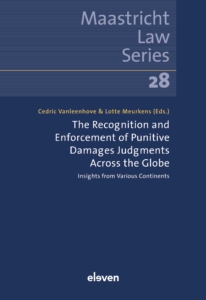Views
Update on the case Monasky v. Taglieri on the determination of habitual residence under the Hague Child Abduction Convention currently before the US Supreme Court
Written by Mayela Celis
For those of you who are interested in the case Monasky v. Taglieri currently before the US Supreme Court, please note that an extremely useful amicus curiae brief was filed this week by Reunite International Child Abduction Centre (as stated on its website Reunite is the “leading UK charity specialising in parental child abduction and the movement of children across international borders”). This brief will certainly help put things into perspective with regard to the weight that should be given to parental intent when determining the habitual residence of the child under the Hague Child Abduction Convention (but it only answers the second question presented). Read more
New Article on Non-Party Access to Court Documents and the Open Justice Principle
Written by Ana Koprivica Harvey
Ms Ana Koprivica Harvey (Max Planck Institute Luxembourg for International, European and Regulatory Procedural Law) recently posted a new paper in the MPILux Research Paper Series, titled Non-Party Access to Court Documents and the Open Justice Principle: The UK Supreme Court Judgment in Cape Intermediate Holdings Ltd v Dring. Below is an overview provided by the Author.
This article analyses the eagerly awaited the UK Supreme Court judgment in Cape Intermediate Holdings Ltd v Dring, unanimously delivered on 29th July 2019. Broadly speaking, the case concerned the scope and operation of the constitutional principle of open justice. More precisely, the questions before the Supreme Court were how much of the written material placed before a court in a civil action should be accessible to persons other than the parties to the proceedings, and how such access should be facilitated. Read more
Service of Process abroad: Lost in Translation
Written by Benedikt Windau
Benedikt Windau, Judge at the Oldenburg District Court (Landgericht Oldenburg), runs a very interesting blog (in German), focusing on German Civil Procedure. In one of his recent postings, he presented a very interesting judgment of the Frankfurt CoA, related to the Service Regulation. Upon my request, he prepared an English version of his post for our blog.
A recent ruling of the Frankfurt Court of Appeals (Docket No. 13 U 210/17) will potentially shake up the (German) law of cross-border service quite a bit, as it imposes new, hence unknown obligations on the plaintiff – and its legal counsel accordingly. Read more
News
Out Now: The Recognition and Enforcement of Punitive Damages Judgments Across the Globe – Insights from Various Continents, by Cedric Vanleenhove & Lotte Meurkens
Maastricht Law Series officially released the recent book edited by Dr Cedric Vanleenhove (Assistant Professor of Private International Law at Ghent University and Maître de Conferences at the HEC Management School of the University of Liège) and Dr Lotte Meurkens (Assistant Professor of Private Law at Maastricht University) titled The Recognition and Enforcement of Punitive Damages Judgments Across the Globe – Insights from Various Continents (Eleven, The Hague, 2023).

The description of the book reads as follows:
Thus far, private international law issues relating to punitive damages have mainly been dealt with from the perspective of several European countries. Systematic research into countries outside Europe was lacking up until
Commentaries on Private International Law-the Latest Issue
We are pleased to present the newest Commentaries on Private International Law (Vol. 6, Issue 1), the newsletter of the American Society of International Law (ASIL) Private International Law Interest Group (PILIG). The primary purpose of our newsletter is to communicate global news on PIL. Accordingly, the newsletter attempts to transmit information on new developments on PIL rather than provide substantive analysis, in a non-exclusive manner, with a view of providing specific and concise information that our readers can use in their daily work. These updates on developments on PIL may include information on new laws, rules and regulations; new judicial and arbitral decisions; new treaties and conventions; new scholarly work; new conferences; proposed new pieces of legislation; and the like.
This issue has two sections. Section one contains Highlights on the application of the CISG in Latin American countries, and PIL and the protection of children. Section two reports on the recent developments on PIL in Africa, Asia, Europe, North America, Oceania, and South America.
The latest PILIG newsletter can be accessed here Summer 2023 ASIL Newsletter
HCCH Monthly Update: June 2023
Conventions & Instruments
On 23 June 2023, Paraguay deposited its instrument of accession to the 1965 Service Convention and the 1970 Evidence Convention. With the accession of Paraguay, the 1965 Service Convention now has 82 Contracting Parties. It will enter into force for Paraguay on 1 January 2024 subject to the Article 28 procedure. As for the 1970 Evidence Convention, with the accession of Paraguay it now has 66 Contracting Parties. It will enter into force for Paraguay on 22 August 2023. More information is available here.
Publications & Documentation
On 6 June 2023, the Permanent Bureau of the HCCH announced the publication of the Toolkit for Preventing and Addressing Illicit Practices in Intercountry Adoption. The Toolkit is intended to assist in the proper implementation and operation of the 1993 Adoption Convention, by providing practical guidelines on what must be done to identify, prevent, and address illicit practices and their enabling factors. More information is available here.
On 21 June 2023, the Permanent Bureau of the HCCH announced the publication of the HCCH’s Strategic Plan for 2023-2028. The Strategic Plan 2023-2028 outlines the mandate and mission of the HCCH, sets out the three strategic goals pursued by the Organisation to fulfil them, and enshrines the guiding principles behind all aspects of the HCCH’s operations. More information is available here. Read more


